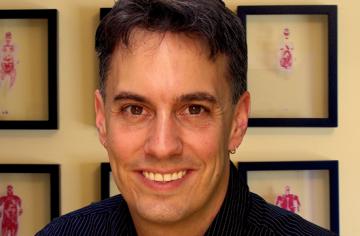Top PhD student explores technological posthumanism
- Robie Liscomb

Have you ever been without your mobile device and felt not quite entirely yourself, as though your very existence were somehow diminished? If you’ve felt such technology withdrawal, then you’ve experienced a visceral awareness of the posthuman condition.
Historically, our sense of self has always been tied up with our use of technology, but with the explosion of information technology, there seems to be a qualitative difference in how we perceive ourselves through the lens of technology
The deep implications of this are the purview of the field of technological posthumanism, and in his Governor General’s Gold Medal-winning dissertation, David Cecchetto has made a “hugely influential” contribution to posthumanist thought.
Cecchetto, who received his PhD in November 2010, first came to UVic to study composition with Christopher Butterfield (music). “Christopher has really cultivated and continued an atmosphere of true experimentation at UVic that is probably unparalleled, certainly in Canada,” says Cecchetto.
After earning his MMus, Cecchetto stayed on for his PhD. “I was attracted to the rigorous interdisciplinarity of the Program in Cultural, Social and Political Thought, and to the opportunity that it gave me to challenge myself to think really specifically about some of the questions my art practice had addressed obliquely,” he explains.
He praises his co-supervisors, Dr. Stephen Ross (English) and Steve Gibson (visual arts) and the other faculty members with whom he was able to work. “Working directly with Stephen Ross was a tremendous asset to me, as he invested considerable time reconstructing the way that I write—and, by extension, greatly clarifying and deepening my thinking. Having the chance to access the various technologies that Steve Gibson was managing at the time, and to take classes with people like Arthur Kroker and Evelyn Cobley was also tremendous, and as it turned out the genuine brilliance of my classmates in the program was a great help to me as well.”
“David’s work is an exhaustive evaluation of the conditions around the posthuman condition, in which human beings have exhibited a profoundly intimate relationship with their technologies,” says Gibson, former professor in digital media in the UVic Department of Visual Arts and currently senior lecturer in interactive media design at the School of Design, Northumbria University. “In addition, his work contains extremely thoughtful insights into the deep relations between technology and culture in the early part of the 21st century.”
Ross describes Cecchetto’s dissertation as “a multi-faceted critique of the key strains of posthumanist thought. It is perhaps the best I’ve ever read. It was so strong that I approached one of the brightest stars in the field of posthumanist studies, Dr. Cary Wolfe, to be David’s external examiner. All signs at present are that David’s dissertation is about to find publication in the most prominent venue possible in his field. His work is already being recognized within the field as not just cutting edge but also hugely influential, by the top scholars in the world. It’s a record of recognition an established researcher could be justifiably proud of; for a recently finished graduate student it is truly enviable.”
His dissertation explores the relationship between technology and what we are as humans. “We understand ourselves through our actions and behaviours, and it is clear that these are—and have always been—directly impacted by our relationship with technologies, in the broadest sense of the term,” says Cecchetto.
“This is an area that is obviously of increasing importance as technologies become both ubiquitous and deeply embedded in our daily lives, and a number of important thinkers have taken it up under the auspices of something called critical posthumanism. I examine three prominent strains of this discourse, in each case seeking after the assumptions and biases that underwrite the perspective, as well as the effects that each has on how we understand our actions as meaningful. What makes my approach unique is that I have linked my critiques to analyses of contemporary new media artworks, specifically emphasizing the ways that attending to sound can offer fresh purchase on these questions.”
Currently, Cecchetto is an assistant professor at OCAD University (Ontario College of Art and Design). “It’s an extremely exciting place to be,” he says. “I've the opportunity to supervise graduate students, to teach specialized courses directly in my areas of interest, and to work in an environment that understands and fosters the overlaps between creative and academic practices. Most of all, I love working with the students and faculty here, who are intensely dedicated to learning in the best sense.”
Cecchetto also pursues an active artistic practice and is currently collaborating on a web-based audio piece called “Exurbia.” It probes the particularities of online communities by creating one that revolves completely around non-text, a-visual, real-time sound. He is also in the early stages of a wearable art project that also has an activist component, in that it is framed as a legal defence of individuals’ right to refuse penetration of their bodies by wireless frequencies.
“I see the creative impulse of my artistic practice as being integral to my research practice because it allows me to think from a place that avows the ways that our own perspective always skews what we find out,” he explains. “In this, I tend to try to live by an injunction that the theorist Jean Baudrillard proposed, which is to always aim to make the world a little less sensible than it is given to me.”
Cecchetto’s dissertation, “A Practice-Informed Critique of Technological Posthumanism and its Ideologies,” is available online at: https://dspace.library.uvic.ca:8443/handle/1828/2829

